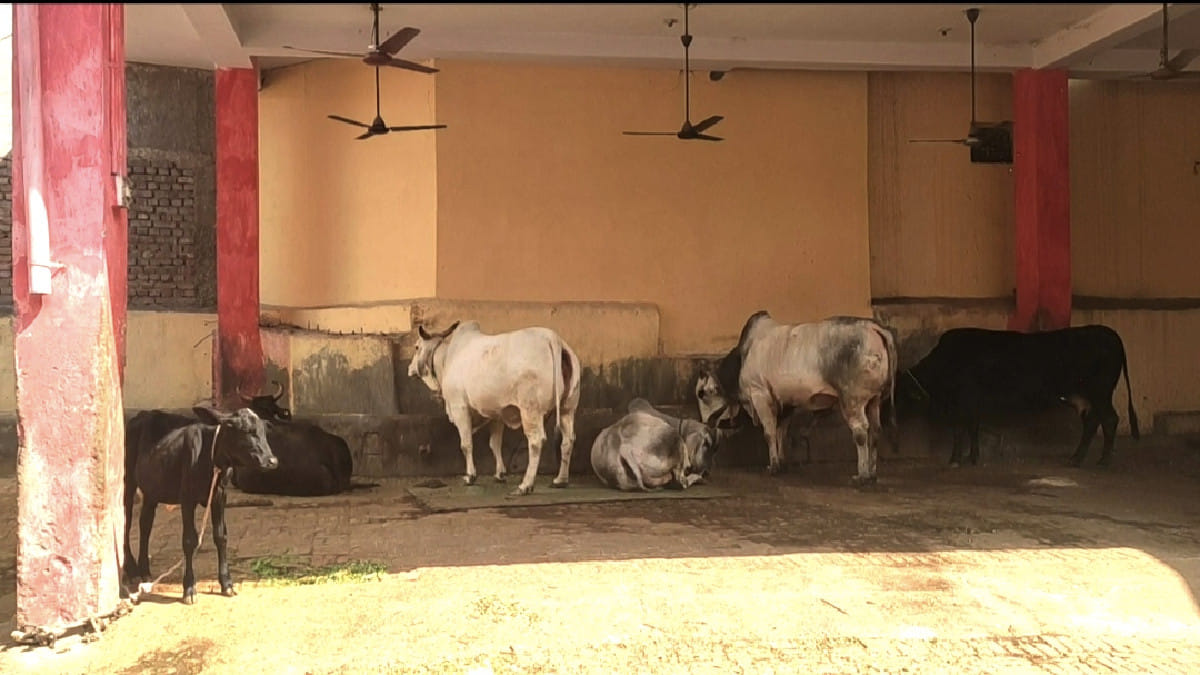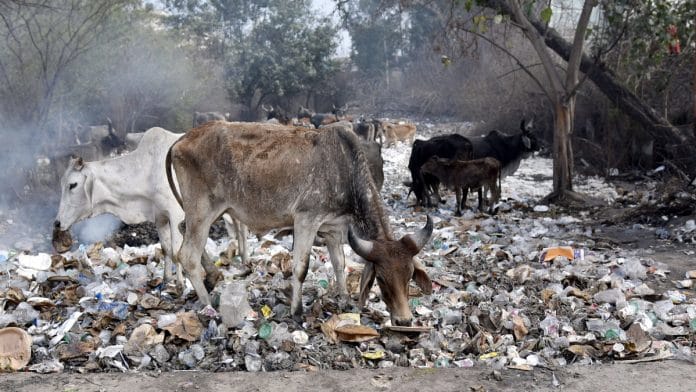New Delhi: Delhi Chief Minister Arvind Kejriwal recently said that if AAP comes to power in Gujarat, they will give all the cattle owners an upkeep allowance of Rs 40 per day for each cow like they do in Delhi. But in the national capital the tussle between the AAP and BJP has left cow shelters feeling abandoned.
Constant sparring between AAP-led Delhi government and BJP-ruled Municipal Corporation of Delhi (MCD) over pending government dues, insufficient funds, increasing cost of upkeep of cow shelters has meant that most of shelter owners are facing an uphill task, as they incur more and more debt to run cow shelters operating beyond capacity.
ThePrint visited Shri Krishna Gaushala in Northwest Delhi’s Bawana and Southwest Delhi’s Dabar Hare Krishna Gaushala in Surhera.
They are the two out of the total four government-affiliated shelters in the city. The other two are Gopal Gausadan in Harewali and Manav Gausadan in Rewla Khanpur, in the Northwest and Southwest parts of the city respectively.
They are all receiving Rs 20 for each cow per day from the Delhi government, while the same amount of funds from the Municipal Corporation of Delhi (MCD) remains pending since 2018. In total, government aid of Rs 40 is supposed to be provided daily to owners for upkeep of each cow.
As you walk through Bawana shelter, you can see a big herd of cows standing in a line wagging tails, saliva dribbling from their mouths as they ready themselves to be fed.
These cows, who were found injured, abandoned, or defected by birth, were rescued by the MCD to be put in the city’s shelters and rehabilitated. Their extent of responsibility towards the animal, however, stopped when it was time for the shelter owners to be compensated monetarily.
Shri Krishna Gaushala, houses about 8,500 against the capacity of 7,600 cattles.
“The per day expenses of one cow is about Rs 103, so in total 8 lakh for all the cows here. Then there are additional expenses for staff, hospital bills, medicines, and electricity. The number of incoming cows keeps on increasing. They are being maintained by a team of 300 people who do their seva (service). The Delhi government is sending us their share of money but MCD funds have not come since the last 3-4 years. All our dependency is now on donations,” says Vijayendra Dhyani, General Manager.
On being asked about the pending payment, Dr VK Singh, Director, Veterinary Department, MCD, said that he can’t comment on the subject of cow shelters as this comes under the animal husbandry department, which is under the Delhi government.
“This (cow shelter) comes under the direct administrative control of the Delhi government. Their allotment is done by them. This matter is pending in the court, where Gaushalas administration has filed a case regarding payment. As per Act, the whole payment is supposed to be done by the Delhi government from creating sheds to taking care of them — all of it is supposed to be their duty,” he said speaking to ThePrint.
Refuting the claims, Dr Rakesh Singh, Director, Animal Husbandry, Delhi government, said that the Gausadans might belong to them but it was the MCD that was putting stray cattles there, so the responsibilities should be shared.
“We are paying the charges on a regular basis. We have spent about Rs 80 crore in the last four to five years and there is around Rs 25 crore pending from MCD. The court case has been filed by gaushalas against North MCD for not paying, but we have also been made part of the case. We don’t have anything to say. They are alleging it’s our liability but that is not true. As per the earlier court order, MCD was directed to give the money but now they are going back on the responsibility,” he said.
Also Read: ‘Low immunity, hard to isolate’: How ageing stray cattle contributed to lumpy skin disease outbreak
Running on loans and donations
Contrary to the celebratory way the government scheme for Delhi cow shelter was related by Kejriwal, the situation on the ground is different as the homes for rescued cows reel under heavy debt.
“We are in debt of about Rs 5 crore to some farmers and villagers from whom we have bought the food for cows. We have to repay the money. We also can’t compromise on the health and wellness of the cow. Though in today’s times, you can’t even buy two cups of tea with Rs 40, it is still some assistance that helps us in its own capacity with expenses. For now, our trustees ask for donations, collect funds from the public and only through that we are running this shelter,” said Dhyani.
The financial situation was similar at the Dabar Hare Krishna Gaushala in Surhera, which has exceeded their capacity of 4000 and are not taking care of 5000 cows, with each animal incurring expenses of more than Rs 100 per day.
“The feed/hay used to be Rs 70-100 per quintal, now it is Rs 1600-1800. In case we don’t have enough funds, we borrow materials required for the upkeep of the livestock required. Borrowing makes the cost of material more expensive,” Chairman Krishan Yadav.
He asks how long they can keep functioning on loans. “We have never let the cows suffer because of money. Our aim/vision is not to let cows face any problem. We will never put them in a state where they will have to walk on roads or eat plastics. We try to get donations from society, our own friends, and sometimes I contribute from my own personal business,” he added.
Cattle menace
Apart from the four government-assisted shelters, there are many other shelters in the city that run on public funds. One such place is the 150-year old Delhi Gate Gaushala in Najafgarh.

It is run entirely on money donated by the residents of 130 villages associated with it. They believe they do just as much as the “sarkari” (government) shelters for the welfare of cows. And despite facing a lack of funds to pay the wages of their 80 workers, tractors for transportation of goods, water, electricity they did not wish for any “assistance” from the government.
“We had a meeting once, where all the heads had gathered to make recommendations. It was concluded there that all the shelters run by the government are not very successful. They don’t nurture the cow as they should. They only get Rs 40, while expenses for a cow runs in hundreds,” said Naresh, the manager of the shelter.
Naresh also talked about how cow’s milk, which could have been a good source of revenue otherwise, doesn’t work for shelters as they generally house male calves, old cows or the ones abandoned for not lactating.
Delhi Gate Gaushala houses 200 milk-producing cows out of the total number of 12,000 to 13,000 cows, while there are 6,000 males among over 8,000 cows at Shri Krishna Gaushala.
“How long can the general public provide money? The amount of unwanted cows on the roads keep increasing, and so does the price of goods. What can be done in this situation is to control illegal dairies that are set up in the middle of cities, on government lands, parks. They leave cows astray after milking them, when they are no longer economical,” said Krishan Yadav of Dabar Hare Krishna Gaushala.
There has been a clash between the AAP and BJP over this, where the former blamed the BJP functionaries for failing to control illegal dairies that discard cattle or let them free to feed on garbage dumpsters.
The BJP had, on the other hand, dismissed the claims as ‘cheap politics’.
Also Read: How Maldharis defeated Gujarat govt’s ‘black’ cattle bill—milky river, WhatsApp, boycott
Missing shelters
Yadav had claimed that initially, there used to be five to six government shelters, but they were reduced to four due to “mismanagement” and “lack of government support.”
According to the Delhi Planning Department, 10 Gausadans were to be set up by NGOs in different localities of Delhi but only seven could be set up as the remaining were “caught up in legal cases/resistance by villagers for allotment of Gram Sabha Land”.
Out of the seven, “Surbhi Gausadan in Sultanpur Dabas, Krishan Kanhaiya Gausadan in Malikpur and Acharya Sushil Muni Gausadan in Ghummenhera” seem to be non-functioning.
While the MCD’s Veterinary Department confirmed that there were only four cow shelters currently functioning, they were not clear about the reasons for such a situation. The Delhi government’s animal husbandry department, on the other hand, said they were not answerable for that.
“We (Delhi govt) haven’t made the cattle sheds, all those gaushalas have been developed by NGOs, we are just giving them maintenance charges,” said Rakesh Singh.
(Edited by Theres Sudeep)
Also Read: Why two key ‘cow constituencies’ are locking horns with BJP govt in poll-bound Gujarat






